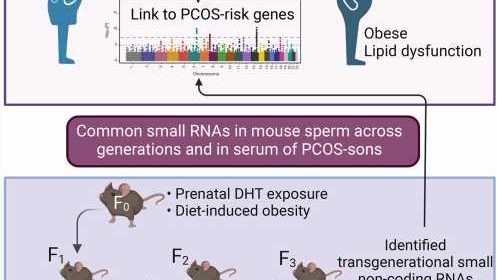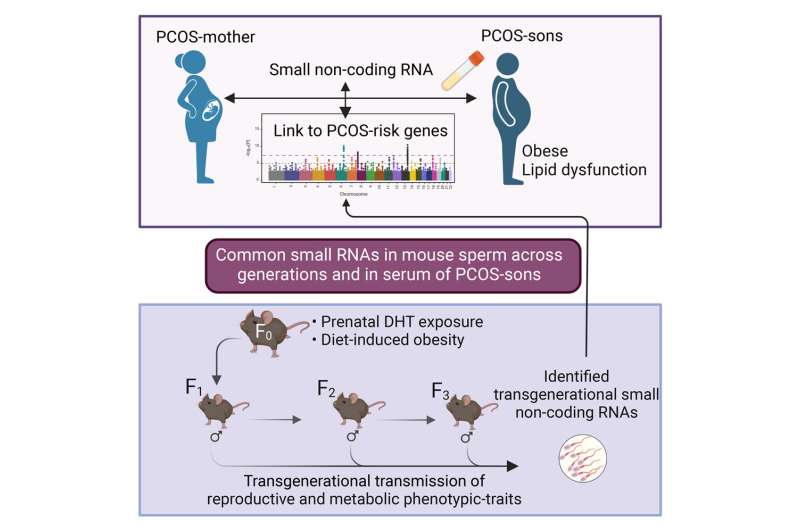How polycystic ovary syndrome can affect the health of future generations of men

Sons of women with polycystic ovary syndrome (PCOS) are three times more likely to develop obesity, according to a study published in Cell Reports Medicine. According to the researchers from Karolinska Institutet the findings highlight a previously unknown risk of passing PCOS-related health problems across generations through the male side of a family.
PCOS is caused by the ovaries producing too much of the sex hormone testosterone. The disease affects around 15 percent of women of childbearing age worldwide and is a condition that can make it difficult to get pregnant. In addition, the disease is associated with various health problems such as diabetes, obesity, and mental illness. Daughters of women with PCOS have a fivefold risk of developing the same disease.
Although it is not yet clear how sons of women with PCOS are affected, research suggests that they are more likely to have weight and hormone problems. The researchers used both registry data and mouse models in the newly published study to determine if and how PCOS-like traits are passed from mothers to their sons. Just over 460,000 sons born in Sweden between July 2006 and December 2015 were included in the registry study.
Of these, roughly 9,000 were sons of women with PCOS. The researchers then identified which of the children were obese.
“We discovered that sons of women with PCOS have a threefold risk of obesity and of having high levels of ‘bad’ cholesterol, which increases the risk of developing insulin resistance and type 2 diabetes later in life,” says Elisabet Stener-Victorin, professor at the Department of Physiology and Pharmacology, Karolinska Institutet who led the study.
These findings were confirmed in the mouse study, where the researchers examined male offspring of female mice that before and during pregnancy were fed either a standard diet or a diet rich in fat and sugar, and were exposed to high levels of the male sex hormone dihydrotestosterone during pregnancy to mimic the pregnancy of normal weight individuals and obese women with PCOS. The male mice were then fed a standard diet until adulthood when their fat distribution and metabolism were examined.
“We could see that these male mice had more fat tissue, larger fat cells, and a disordered basal metabolism, despite eating a healthy diet,” says Elisabet Stener-Victorin.
To investigate the reproductive function of the offspring and whether physiological characteristics can be passed on from generation to generation, the first-generation male mice were mated with healthy female mice that were not exposed to male sex hormones or a diet rich in fat and sugar.
The whole process was repeated in the second generation to reach the third generation which is the first generation that was not affected by the mother condition.
“Through these experiments, we can show that obesity and high levels of male hormones in the woman during pregnancy can cause long-term health problems in the male offspring. Their fat tissue function, metabolism, and reproductive function deteriorate, which in turn affects future generations,” says Qiaolin Deng, associate professor at the same department and one of the researchers behind the study.
“These findings are important because they highlight the risk of passing health problems down through the male side of a family, highlight the risk of passing this kind of health problem, and they may help us in the future to find ways to identify, treat and prevent reproductive and metabolic diseases at an early stage,” says Elisabet Stener-Victorin.
More information:
Elisabet Stener-Victorin, Transgenerational transmission of reproductive and metabolic dysfunction in the male progeny of polycystic ovary syndrome, Cell Reports Medicine (2023). DOI: 10.1016/j.xcrm.2023.101035. www.cell.com/cell-reports-medi … 2666-3791(23)00149-0
Journal information:
Cell Reports Medicine
Source: Read Full Article
